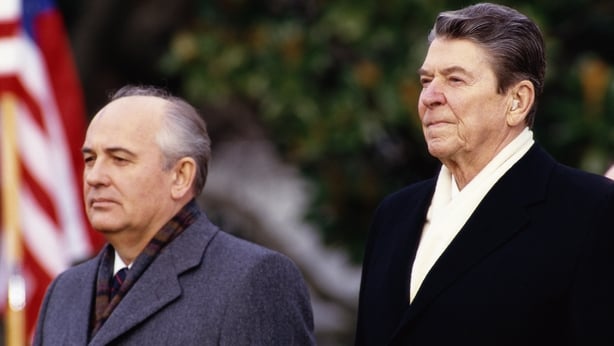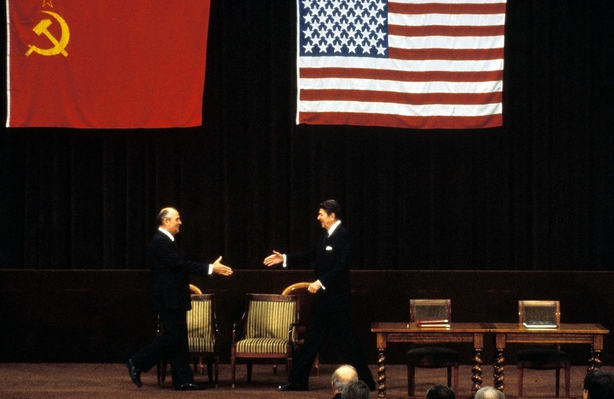Mikhail Gorbachev, who ended the Cold War without bloodshed but failed to prevent the collapse of the Soviet Union, has died at the age of 91, hospital officials in Moscow have said.
"Mikhail Sergeevich Gorbachev died this evening after a serious and long illness," the Central Clinical Hospital in Moscow said, quoted by the Interfax, TASS and RIA Novosti news agencies.
Gorbachev, the last Soviet president, was in power between 1985 and 1991 and helped bring US-Soviet relations out of a deep freeze.
He forged arms reduction deals with the US and partnerships with Western powers to remove the Iron Curtain that had divided Europe since World War II and bring about the reunification of Germany.
When pro-democracy protests swept across the Soviet bloc nations of communist Eastern Europe in 1989, he refrained from using force, unlike previous Kremlin leaders who had sent tanks to crush uprisings in Hungary in 1956 and Czechoslovakia in 1968.
But the protests fuelled aspirations for autonomy in the 15 republics of the Soviet Union, which disintegrated over the next two years in chaotic fashion. Gorbachev struggled in vain to prevent that collapse.

On becoming general secretary of the Soviet Communist Party in 1985, aged just 54, he had set out to revitalise the system by introducing limited political and economic freedoms, but his reforms spun out of control.
His policy of 'glasnost' - free speech - allowed previously unthinkable criticism of the party and the state, but also emboldened nationalists who began to press for independence in the Baltic republics of Latvia, Lithuania, Estonia and elsewhere.
Many Russians never forgave Gorbachev for the turbulence that his reforms unleashed, considering the subsequent plunge in their living standards too high a price to pay for democracy.
He spent much of the last two decades on the political periphery, intermittently calling for the Kremlin and the White House to mend ties as tension soared to Cold War levels since Russia annexed Crimea in 2014 and launched an offensive in Ukraine earlier this year.
Gorbachev spent the twilight years of his life in and out of hospital with increasingly fragile health and observed self-quarantine during the Covid-19 pandemic as a precaution.

He was remembered fondly in the West, where he was referred to affectionately by the nickname Gorby.
He won a Nobel Peace Prize in 1990 for negotiating a historic nuclear arms pact with US leader Ronald Reagan.
His decision to withhold the Soviet army when the Berlin Wall fell a year earlier was seen as key to preserving Cold War peace. He was awarded the Freedom of Dublin in 2002.
Gorbachev will be buried in Moscow's Novodevichy Cemetery next to his wife Raisa, who died in 1999, said Tass news agency, citing a source familiar with the family's wishes.
Russian President Vladimir Putin expressed his condolences at Gorbachev's passing, a Kremlin spokesperson told the Interfax news agency.
"In the morning he will send a telegram of condolences to his family and friends."
Saddened to hear of the passing of Mikhail Gorbachev.
— Micheál Martin (@MichealMartinTD) August 30, 2022
His sense of history, and commitment to openness, reform, and building bridges with the West, changed the world.
Taoiseach Micheál Martin said he was "deeply saddened" to hear of Gorbachev's passing, describing him as one of the "most significant political figures" of the late twentieth Century.
"At a time when the threat to the world of nuclear destruction was very real, he saw the urgent need for rapprochement with the west and for greater openness and reform - glasnost and perestroika - in the then Soviet Union," Mr Martin said in a statement this evening.
"His leadership helped to end the arms race between the east and west, end the Cold War and bring down the Iron Curtain that had divided Europe since the Second World War.
"That contributed directly to the enlargement of the European Union that came to fruition during Ireland’s 2004 Presidency of the EU."
Mr Martin said there were "very few figure" who can be said to have "truly changed the world".
"Mikhail Gorbachev was one. He will long be remembered."
Mikhail Gorbachev was a trusted and respected leader. He played a crucial role to end the Cold War and bring down the Iron Curtain. It opened the way for a free Europe.
— Ursula von der Leyen (@vonderleyen) August 30, 2022
This legacy is one we will not forget.
R.I.P Mikhail Gorbachev
The president of the European Commission said Mikhail Gorbachev's legacy is "one we will not forget".
In a Twitter post, Ursula von der Leyen said he was a "trusted and respected leader".
"He played a crucial role to end the Cold War and bring down the Iron Curtain. It opened the way for a free Europe," she said.
"This legacy is one we will not forget. R.I.P Mikhail Gorbachev."
UN Secretary-General Antonio Guterres hailed Gorbachev as a unique leader who changed the world for the better.
In a statement, he said he was a "a one-of-a kind statesman who changed the course of history" who did more than any other individual to bring about the peaceful end of the Cold War.

